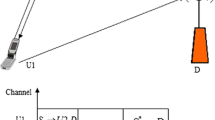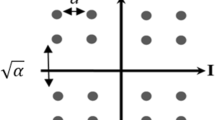Abstract
Hybrid automatic repeat request (HARQ) is one of the reliable schemes in wireless communication environment, and it is well established in this paper. To combat the fading process in wireless channels, antenna diversity is widely used. But hybrid ARQ scheme with antenna diversity is not studied so far. In this chapter, two important space diversity techniques, namely switch antenna diversity (SAD) and non-switch diversity (NSD), are discussed with HARQ scheme to achieve higher throughput. The mathematical analysis of HARQ is carried out, and the results show that the protocol may provide a higher value of throughput.
Access this chapter
Tax calculation will be finalised at checkout
Purchases are for personal use only
Similar content being viewed by others
References
Caire, G., Tuninetti, D.: The throughput of hybrid-ARQ protocols for the Gaussian collision channel. IEEE Trans. Inf. Theory 47(5), 1971–1988 (2001)
Kundu, M., Chakraborty, K.S.: Mathematical comparison of throughput analysis of ARQ mechanism. IJRSI 4(10), 85–88 (2017)
Bhunia, C.T.: ARQ techniques: review and modifications. J. IETE Tech. Rev. 18(5), 381–401 (2001)
Lin, S., Costello, D.J.: Error control coding, vol. 2. Prentice Hall, Englewood Cliffs (2004)
Khosravirad, S.R., Szczecinski, L., Labeau, F.: Rate allocation for HARQ in relay-based cooperative transmission. In: Wireless Communications and Networking Conference, pp. 2757–2762, IEEE (2014)
Tellambura, C., Annamalai, A., Bhargava, V.K.: Unified analysis of switched diversity systems in independent and correlated fading channels. IEEE Trans. Commun. 49(11), 1955–1965 (2001)
Chakraborty, S.S., Liinaharja, M., Ruttik, K.: Diversity and packet combining in Rayleigh fading channels. IEE Proc. Commun. 152(3), 353–356 (2005)
Lott, C., Milenkovic, O., Soljanin, E. Hybrid ARQ: theory, state of the art and future directions. In: Information Theory for Wireless Networks, 2007 IEEE Information Theory Workshop, pp. 1–5 (2007)
Gopalakrishnan, N.: Achievable rates and rate selection algorithms for incremental redundancy (IR) hybrid ARQ (HARQ) wireless systems. Doctoral dissertation, Purdue University (2008)
Gopalakrishnan, N., Gelfand, S.: Achievable rates for adaptive IR hybrid ARQ. In: Sarnoff Symposium, pp. 1–6 (2008)
Malkamaki, E., Leib, H.: Coded diversity on block-fading channels. IEEE Trans. Inf. Theory 45(2), 771–781 (1999)
Wu, P., Jindal, N.: Performance of hybrid-ARQ in block-fading channels: a fixed outage probability analysis. IEEE Trans. Commun. 58(4), 1129–1141 (2010)
Byun, I., Kim, K.S.: Cooperative hybrid-ARQ protocols: unified frameworks for protocol analysis. CoRR, vol. abs/0812.2301 (2008)
Cheng, J.F., Wang, Y.P., Parkvall, S.: Adaptive incremental redundancy [WCDMA systems]. In: IEEE 58th Vehicular Technology Conference, vol. 2, pp. 737–741 (2003)
Malkamaki, E., Leib, H.: Coded diversity on block-fading channels. IEEE Trans. Inf. Theory 45, 771–781 (1999)
Khosravirad, S.R., Szczecinski, L., Labeau, F.: Opportunistic relaying without CSI: optimizing variable-rate HARQ, submitted to IEEE Transactions on Vehicular Technology (2014)
Szczecinski, L., Khosravirad, S.R., Duhamel, P., Rahman, M.: Rate allocation and adaptation for incremental redundancy truncated HARQ. IEEE Trans. Commun. 61(6), 2580–2590 (2013)
Khosravirad, S.R., Szczecinski, L., Labeau, F.: Rate adaptation for cooperative HARQ. IEEE Trans. Commun. 62(5), 1469–1479 (2014)
Acknowledgements
The author would like to acknowledge Visvesvaraya Ph.D. Scheme (MeitY, Government of India) and National Institute of Technology Arunachal Pradesh for their infrastructural and financial support.
Author information
Authors and Affiliations
Corresponding author
Editor information
Editors and Affiliations
Rights and permissions
Copyright information
© 2019 Springer Nature Singapore Pte Ltd.
About this paper
Cite this paper
Kundu, M., Chakraborty, S.K. (2019). Studies of Optimization of Throughput: Combining Receiver Diversity in Hybrid ARQ Scheme Over Fading Channel. In: Abraham, A., Dutta, P., Mandal, J., Bhattacharya, A., Dutta, S. (eds) Emerging Technologies in Data Mining and Information Security. Advances in Intelligent Systems and Computing, vol 814. Springer, Singapore. https://doi.org/10.1007/978-981-13-1501-5_48
Download citation
DOI: https://doi.org/10.1007/978-981-13-1501-5_48
Published:
Publisher Name: Springer, Singapore
Print ISBN: 978-981-13-1500-8
Online ISBN: 978-981-13-1501-5
eBook Packages: Intelligent Technologies and RoboticsIntelligent Technologies and Robotics (R0)




